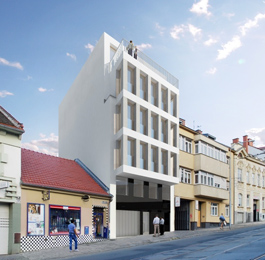
<Satelitní bydlení> is no longer appealing, people are returning to <města>
 |
"The trend from the late nineties, when people moved from the city to so-called satellite towns, has been replaced in recent years by a completely opposite trend - people are moving back," claims Jan Zachystal from Re/Max Alfa. According to him, the main reasons are the completely inadequate infrastructure and often problematic transport accessibility. "These areas were primarily populated by families with children, who soon discovered that there were not enough schools, kindergartens, or recreational facilities," added Zachystal, who believes that most satellites are just another form of living in panel houses.
Monika Christová from Maxima Reality shares a similar opinion. "The boom of moving far beyond the borders of Prague is over; people prefer locations with good transport accessibility and civic amenities, and they would rather head out to nature on weekends," noted Christová. People considering new housing are increasingly realizing that hassle-free transportation is crucial for daily practical life. "Families with small children look for well-equipped locations with kindergartens and schools, as well as facilities related to extracurricular activities. Daily access to school and cultural activities is important for older children," outlined Christová, listing the essential amenities for suitable housing, noting that many satellite constructions lack these features.
The decline in the popularity of satellite towns has also been observed for some time by Filip Ondruš, manager of the development department at Century 21 real estate agency. "People have realized that living on the outskirts of a city or in a small village offers peace but also problems with infrastructure, transport, and civic amenities," pointed out Ondruš.
Mikuláš Ordnung, the commercial director of the developer Manghi.cz, criticizes oversized satellites with minimal usable space. "House next to house, each different, tiny lots around each, minimal privacy, no functioning community, not to mention often inadequate infrastructure, insufficient civic amenities, and frequently catastrophic traffic conditions - these are the main reasons why the boom of this rather negatively perceived satellite living is slowing down in our country," believes Ordnung.
In stark contrast, Ondřej Diblík, an analyst at Lexxus, argues that owning a separate family house is still the pinnacle of housing options. "It provides not only the possibility of realizing individual needs and housing ideas but also the greatest degree of privacy and independence," Diblík emphasized. According to him, suburban areas for building family homes are still very much in demand.
"From time to time, opinions about the end of satellite towns and a return to cities arise, but the opposite is true. There is sustained interest in individual construction and the purchase of building plots, and the construction of family homes significantly exceeds that of apartments," responded Diblík.
According to Michal Kresta, the commercial director of Realitní kancelář Sting, interest in satellites varies regionally and is influenced by distance from city centers and especially civic amenities. "For those interested in living in a satellite, the key factors include how long it takes to get to work, whether there is a kindergarten, school, or cultural activities available nearby. There are cases of satellite town projects that meet these requirements and are in high demand," he said.
However, the ongoing crisis in the real estate sector, which is pushing prices down, also works against living in satellite developments. "In the past, living in a satellite was an affordable alternative that, at the cost of certain inconveniences, offered more living space. However, over time, people realized that they lived in the city during the day and were only in the satellite for overnight stays," said Zachystal from Re/Max Alfa. He believes that the drop in property prices is allowing more and more people to seek housing directly in city centers.
The English translation is powered by AI tool. Switch to Czech to view the original text source.
2 comments
add comment
Subject
Author
Date
obrázek
Jana
20.05.13 02:19
re
tr
20.05.13 05:55
show all comments








